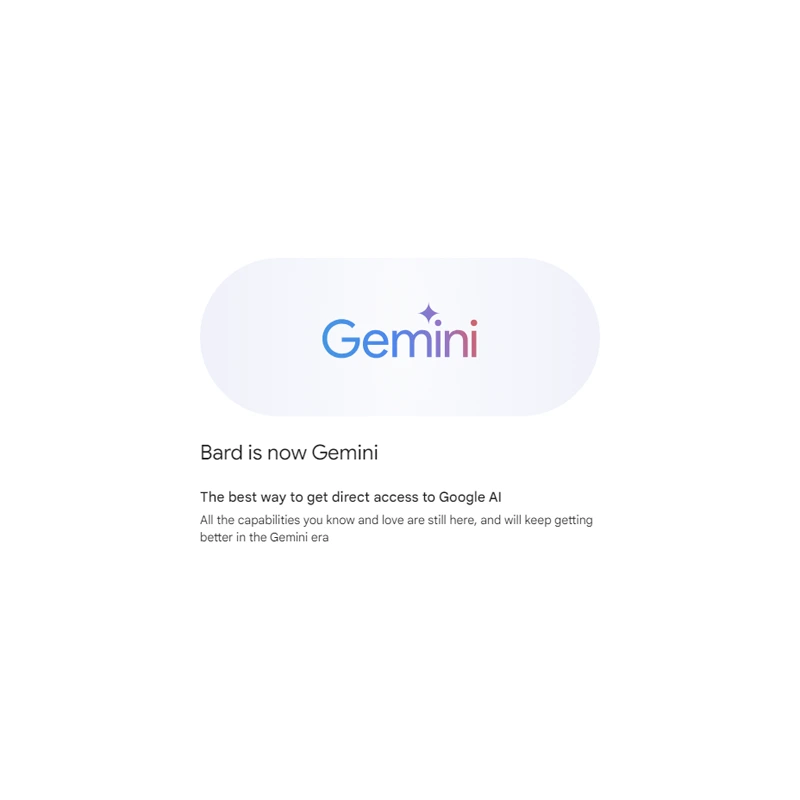
Despite only being one part of it, Google is almost synonymous with the internet itself.
This happens because Google indexes pretty much the entire World Wide Web, and make almost everything on the web searchable. With Google Search, it pretty much conquered the industry with no worthy opponent.
Until something disrupted it.
Since the advent of ChatGPT from OpenAI, the tech titan has been on its toes.
It was a "code red" alert, and that CEO Sundar Pichai even had to summon Google's two co-founders to return.
After unleashing Bard, and after introducing Gemini, Google is making yet another announcement.
Today, we’re entering the next chapter of our Gemini era by bringing our #GeminiAI models to more of our products, starting with Bard — which will now be called Gemini. https://t.co/KFRp1qkfHg pic.twitter.com/WKHZyv3Ejp
— Google (@Google) February 8, 2024
Google is known for its keen interest in creating new ideas, chasing new ventures and develop new projects.
After all, the company is known for having a long list of similar products with confusingly different names and seemingly nothing in common.
Out of the many, only a small fraction of them make it to the surface, and that only a few of them are continuously maintained.
And out of them, Google only relied on a handful, and consider them its core products.
This time, when it comes to its AI, going forward, Google only want one name that matters, and that name is Gemini.
Arguably one of the biggest updates in Google's history, the company unleashed the full version of its Gemini AI model, and changing its Bard chatbot's name to Gemini.
The company also launched a dedicated Gemini mobile app on Android and introduced Gemini to its Google app on iOS.
With Gemini on people's phones, Google is giving Google users on both Android and iOS a full-fledged AI device. That’s probably less exciting than it sounds (if it sounds exciting at all). At this point, large language models like Gemini and ChatGPT can be good for basic writing tasks, brainstorming, generating images, coding, and not a ton more.
Google also added Gemini to Google Assistant.
And because AI has become such a lucrative business, Google also introduced a premium AI subscription for the service.
Google shaped it a lot like OpenAI with its ChatGPT Plus.
The free version of Gemini runs on the basic Gemini Pro model, just like the free ChatGPT tier runs on GPT-3.5. Users who wish to use the full capabilities of Gemini, must opt for Gemini Ultra, which costs is also influenced by what OpenAI charges for GPT-4.
According to Google, Gemini Ultra is the most advanced AI on the market, saying that it is the first AI model to outperform human experts on a standardized test called MMLU (massive multitask language understanding), which measures an AI’s knowledge and problem-solving capabilities in a combination of 57 subjects such as math, physics, history, law, medicine, and ethics.
Introducing Gemini Ultra as a subscription service, Google makes it come with other perks as well.
Google has introduced a new premium tier of Google One, the subscription service that gives you more storage and other perks. And Gemini Ultra comes as part of the new Google One AI Premium plan, which includes all the perks of the 2-terabyte storage plan.
According to Sissie Hsiao, Vice President of Gemini Experiences and Google Assistant, speaking at a press conference:
"For Google, Gemini is more than just the models. It’s really a shift in how we think about the state of the art technology and the entire ecosystem that we’re building on it, from products that affect billions of users to the APIs and platforms that developers and businesses use to innovate."
Read: The 'Gemini' AI From Google DeepMind Should Surpass ChatGPT, Said Google DeepMind
With Google's Gemini spanning across Google’s services, the company wants everything AI in its company to be called Gemini.
As a major shift in how the company wants to be perceived, Google is seemingly eyeing on a future where an internet search engine is no longer that relevant.
But before it can force users to use AI, the company is still putting Gemini on the backstage, and that users have to seek it out to use it.
While the launch of Gemini is indeed disruptive, there are consequences.
In the history of computers, people had to translate their thoughts, desires, and intentions into the language of machines. Then, the products that came out of that, allow users to interact with the computer using predetermined commands.
But with AI, human-computer interaction is becoming much more "human."
And Google, by introducing Gemini, is putting the world closer to the reality, where machines can finally understand users intention, without having to be told.
If Google can make it right, this is indeed a business worth investing.
